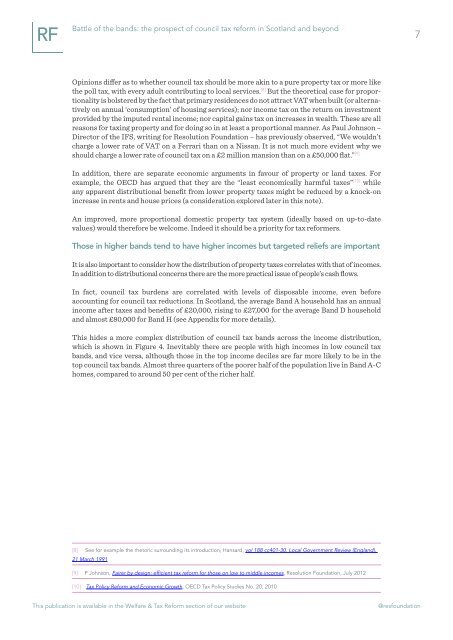Battle of the bands
Battle-of-the-bands
Battle-of-the-bands
You also want an ePaper? Increase the reach of your titles
YUMPU automatically turns print PDFs into web optimized ePapers that Google loves.
<strong>Battle</strong> <strong>of</strong> <strong>the</strong> <strong>bands</strong>: <strong>the</strong> prospect <strong>of</strong> council tax reform in Scotland and beyond<br />
<br />
7<br />
Opinions differ as to whe<strong>the</strong>r council tax should be more akin to a pure property tax or more like<br />
<strong>the</strong> poll tax, with every adult contributing to local services. [8] But <strong>the</strong> <strong>the</strong>oretical case for proportionality<br />
is bolstered by <strong>the</strong> fact that primary residences do not attract VAT when built (or alternatively<br />
on annual ‘consumption’ <strong>of</strong> housing services); nor income tax on <strong>the</strong> return on investment<br />
provided by <strong>the</strong> imputed rental income; nor capital gains tax on increases in wealth. These are all<br />
reasons for taxing property and for doing so in at least a proportional manner. As Paul Johnson –<br />
Director <strong>of</strong> <strong>the</strong> IFS, writing for Resolution Foundation – has previously observed, “We wouldn’t<br />
charge a lower rate <strong>of</strong> VAT on a Ferrari than on a Nissan. It is not much more evident why we<br />
should charge a lower rate <strong>of</strong> council tax on a £2 million mansion than on a £50,000 flat.” [9]<br />
In addition, <strong>the</strong>re are separate economic arguments in favour <strong>of</strong> property or land taxes. For<br />
example, <strong>the</strong> OECD has argued that <strong>the</strong>y are <strong>the</strong> “least economically harmful taxes” [10] while<br />
any apparent distributional benefit from lower property taxes might be reduced by a knock-on<br />
increase in rents and house prices (a consideration explored later in this note).<br />
An improved, more proportional domestic property tax system (ideally based on up-to-date<br />
values) would <strong>the</strong>refore be welcome. Indeed it should be a priority for tax reformers.<br />
Those in higher <strong>bands</strong> tend to have higher incomes but targeted reliefs are important<br />
It is also important to consider how <strong>the</strong> distribution <strong>of</strong> property taxes correlates with that <strong>of</strong> incomes.<br />
In addition to distributional concerns <strong>the</strong>re are <strong>the</strong> more practical issue <strong>of</strong> people’s cash flows.<br />
In fact, council tax burdens are correlated with levels <strong>of</strong> disposable income, even before<br />
accounting for council tax reductions. In Scotland, <strong>the</strong> average Band A household has an annual<br />
income after taxes and benefits <strong>of</strong> £20,000, rising to £27,000 for <strong>the</strong> average Band D household<br />
and almost £80,000 for Band H (see Appendix for more details).<br />
This hides a more complex distribution <strong>of</strong> council tax <strong>bands</strong> across <strong>the</strong> income distribution,<br />
which is shown in Figure 4. Inevitably <strong>the</strong>re are people with high incomes in low council tax<br />
<strong>bands</strong>, and vice versa, although those in <strong>the</strong> top income deciles are far more likely to be in <strong>the</strong><br />
top council tax <strong>bands</strong>. Almost three quarters <strong>of</strong> <strong>the</strong> poorer half <strong>of</strong> <strong>the</strong> population live in Band A-C<br />
homes, compared to around 50 per cent <strong>of</strong> <strong>the</strong> richer half.<br />
[8] See for example <strong>the</strong> rhetoric surrounding its introduction, Hansard, vol 188 cc401-30, Local Government Review (England),<br />
21 March 1991<br />
[9] P Johnson, Fairer by design: efficient tax reform for those on low to middle incomes, Resolution Foundation, July 2012<br />
[10] Tax Policy Reform and Economic Growth, OECD Tax Policy Studies No. 20, 2010<br />
This publication is available in <strong>the</strong> Welfare & Tax Reform section <strong>of</strong> our website<br />
@resfoundation


